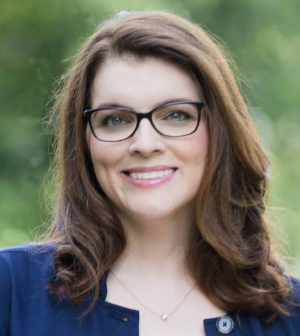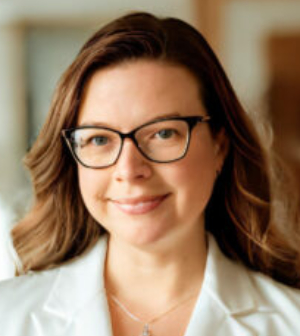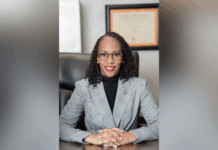A Mercer University alumna is leading a volunteer effort to provide trauma therapy for those impacted by the recent shooting at Apalachee High School in Winder.
Lauren Stinson, who earned her master’s in clinical mental health counseling from the College of Professional Advancement in 2016, is certified in a specialized trauma therapy technique called eye movement desensitization and reprocessing, or EMDR.
While she has her own private practice, she also is the volunteer EMDR consultant for the Trauma Recovery Network Humanitarian Assistance Programs for Georgia. In this role, she organizes therapists trained in EMDR and other advanced trauma therapy techniques to deploy to sites of man-made or natural disasters in the state.

“Our goal is really at the beginning to deploy as quickly as possible and get to people in the short term to help prevent PTSD,” Stinson said. “Research has shown that the quicker you can get to someone who’s had something traumatic happen, the more likely it is that they won’t develop PTSD, and so it makes it a lot easier for any therapy moving forward.”
EMDR is especially helpful to prevent post-traumatic stress disorder in the immediate aftermath of a traumatic event, she said.
“When people have just gone through trauma — because they’re not at the point where they can process things super well — EMDR helps to reduce the emotional charge, helps them to prevent PTSD,” she said. “With EMDR, you are processing things much more quickly using eye movements. It moves things along more quickly than if you did a full debrief.”
The Sept. 4 shooting at Apalachee left four dead and nine injured. Volunteer trauma therapists deployed to the area within days and set up at a local church for three weekends to provide therapy to dozens of students, teachers, staff and parents. Ongoing therapy is planned to be offered once a month, Stinson said.
Those impacted by the shooting were offered group or individual therapy. They also had access to therapy dogs and art therapy, she said. Many will continue with their own therapist long-term.
“With those people that I’ve worked with ongoing since we started working up at Winder, I’m seeing a huge difference. People are able to be present at that school,” Stinson said. “Yes, they have their triggers, but, as they say, their triggers don’t have them. Being able to recognize the triggers and come into session and continue to process that out, it’s been a really good experience for them.”
Mercer alumna Dr. Tara Overzat, who is also an adjunct professor in the counseling department in the College of Professional Advancement, was among the volunteer therapists who deployed to Winder after the school shooting. She provided one-on-one EMDR therapy while she was there and offered six free follow up sessions to the people who met with her.

“We know that the sooner you are able to process a traumatic event, the shorter the long-term consequences, versus if you try to pretend it didn’t happen, not talk about it, not process it, and it comes back in a much larger way later,” said Dr. Overzat, who earned her Ph.D. in counselor education and supervision and master’s in clinical mental health counseling at Mercer. “Long-term consequences are things like nightmares, increased use of substances to help people forget, increased stress that can cause stress-related illness, also anxiety and depression.”
She also is working on connecting Apalachee teachers with teachers from Marjory Stoneman Douglas High School, which was the scene of a deadly mass shooting in 2018. Teachers from the Parkland, Florida, school said they benefited from talking to teachers from Colorado’s Columbine High School, which experienced a high-profile mass shooting in 1999.
Dr. Overzat graduated from Stoneman Douglas before the shooting there, but it still hit her hard.
“When Stoneman Douglas happened, it was surreal. You never think it’s going to be your high school,” she said. “And then to be sitting here a few weeks ago and to hear what happened at Apalachee, it was like, ‘Oh my God, again.’ I was very shocked. And then in the days after, it became, ‘What can I do to help?’”
Dr. Overzat and Stinson chose to help by providing specialized trauma therapy in a time of need. They can’t undo the trauma, but they can help people live with it.










